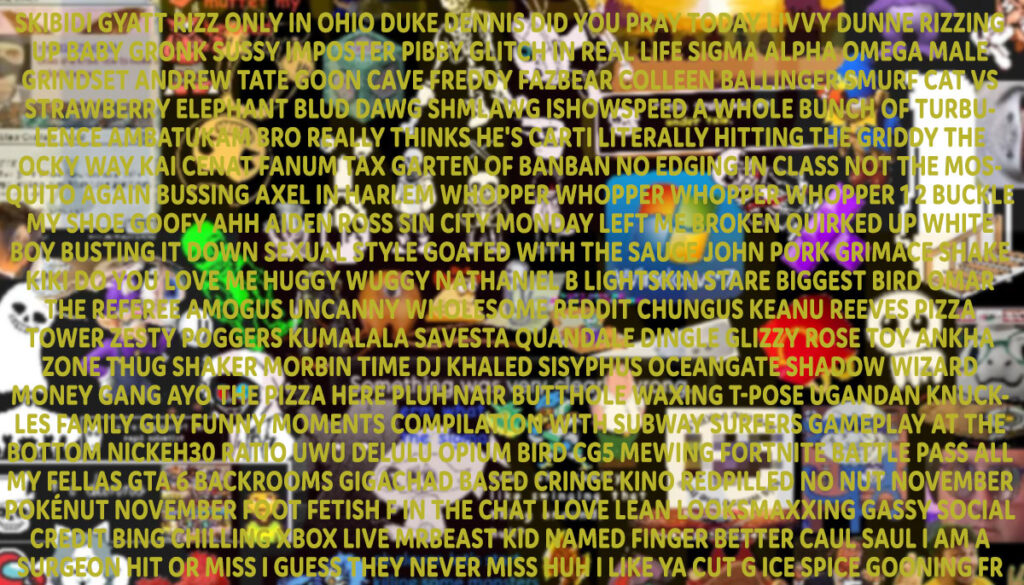
40 Brainrot Slang Words and Phrases Explained
When brainrot (sometimes written as brain rot) was named as 2024 Word of the Year by Oxford University Press, many people were baffled, and search engines were swamped with “brainrot meaning” queries. However, others were all too familiar with the term, especially those affected by brainrot and their concerned friends and family.
This is because people with brainrot don’t just forfeit the time they could be doing something more productive by mindlessly scrolling trivial memes and videos; they often experience harmful effects as well. These can include lack of focus, cognitive impairment, mental health issues, and digital addiction.
Another negative aspect of brainrot is a breakdown in relations with loved ones. Hours spent consuming low-value cheap dopamine online content can impact the way that individuals think, act, and speak. It can even lead them to become someone who is termed, chronically online. They constantly use slang words and phrases that make no sense to others, and this can cause a chasm with friends and family.
A-Z of brainrot terminology

In response to repeated requests for a brainrot meaning slang buster, we’ve created a glossary of terms to decode the most common words and phrases that appear in viral content on platforms like TikTok, Snapchat, and Instagram.
Alpha, beta, and sigma – slang terms used in memes to describe social hierarchies among men: alpha is a leader, beta is a follower, and sigma is a dominant man outside the alpha-beta hierarchy
Axel in Harlem – a humorous brainrot meme used to highlight random and confusing situations where the phrase seems out of context
Baby Gronk – the nickname of Madden San Miguel, a young football prodigy; the term is sometimes used to describe a person with great potential
Blud – a slang term for friend, like buddy or bro
Brainrot vibes – the feeling of being mentally overwhelmed or consumed by something
Bussin – when something is excellent, delicious, flavorsome, or exceeds expectations; often used in relation to food
Cheugy – describes something outdated and uncool that’s no longer in fashion
Cringe — something or someone that’s embarrassing or awkward
Dawg or shmlawg – someone you’d hang out with; similar words are dude and buddy
Delulu – short for “delusional,” used to describe someone who behaves strangely or irrationally
Did you pray today? – viral catchphrase from a song by U.S. rapper Young Thug that appears in memes, often used to show something that might need a quick prayer, like checking your bank account
Doomscrolling – mindlessly scrolling through online content for hours on end, which can contribute to brainrot
Fandoms – communities of fans with a shared passion for a celebrity, sports team, TV show, pop group, etc., which can lead to brainrot if they spend a lot of time immersed in this special interest online
Fanum tax – refers to the theft of food between friends, initially used by the Dominican-American streamer Fanum, and now a popular meme
FR – abbreviation of “for real”
Gassy – full of hot air, idle talk, or empty chat
Goated with the sauce – refers to the sauce served with goat meat, referencing the acronym GOAT, which stands for “greatest of all time”
Goblin mode – a type of behavior that’s slothful or self-indulgent with no concern for social norms, e.g., not bothering to shower or change clothes for several days
Goofy ahh – a slang phrase used in memes and online messages to describe something or someone that’s silly or foolish; the ahh is a drawn-out way to emphasize the absurdity
Grindset – a mindset centered on constant effort and hard work to achieve success, focusing on achieving goals at all costs
Gyatt – a term used to express excitement or shock, particularly in response to seeing an attractive woman
Hitting the griddy – doing a dance move called the griddy, created by U.S. high school football player Allen Davis, which went viral on TikTok in 2019
Looksmaxxing – a trend that encourages young men to enhance their appearance in various ways, from skincare and basic hygiene to more extreme measures
No cap – slang for “no lie” or “I’m being serious” to convey the truth
Not the mosquito again – a term used in memes to express irritation about a repeated annoyance
Mewing – pulling a strange facial expression for comedic effect
Only in Ohio – refers to anything that’s quirky, strange, or random
Rizz – a short way to say “charisma” and refers to someone’s flirting ability (Oxford University Press 2023 Word of the Year)
Shlawg – criticize or disapprove of someone or something in a nasty way
Simp – someone who’s excessively attentive or adoring toward another person, often used in a humorous or disparaging way.
Slaps – describes something that’s exceptionally good or impactful
Skibidi – can mean good, cool, bad, evil, or dumb depending on the context
Spiraling – a rapid decline in a person’s emotional state
Stan – be a fan of someone or something, comes from the song by Eminem
Sussy or sus – short for suspicious, used in the video game Among Us
UwU – a cute face used to express happiness or affection in online chats, sometimes used ironically
Vibe check – assess the mood of an individual, group, or situation to see if it’s what you expected
Yass – an exaggerated way of saying yes to express excitement or approval, often associated with LGBTQ+ culture
Yeet – used to show excitement or surprise in various situations, like doing a dance move or throwing something
Zesty – a slang term that can describe a person (as lively or quirky), a situation (as dramatic or unpredictable), or an action (as bold or cheeky)
Need help?

As experts in gaming and screen addiction, we regularly receive messages on our Game Quitters support groups and forums from individuals and their loved ones seeking advice about brainrot and how to cure it.
We know that excessive time spent online can cause changes in the brain due to disrupted dopamine production, leading to addictive behavior. This can make it difficult for individuals to control their online activities or make rational decisions about the amount of time they spend scrolling mindless memes rather than pursuing other hobbies or interests.
Families often feel like they’re losing the person affected by this debilitating condition, which can be frightening and frustrating. Trying to communicate with them becomes increasingly difficult as they retreat further and further into their online world. And when they do speak, they use words and phrases that seem completely alien.
If this sounds all too familiar, we can provide specialist support. Our coaching programs are designed to help affected individuals and families regain balance with technology.
Take the first step today and book a call to discuss your situation. Please note that limited spots are available.
